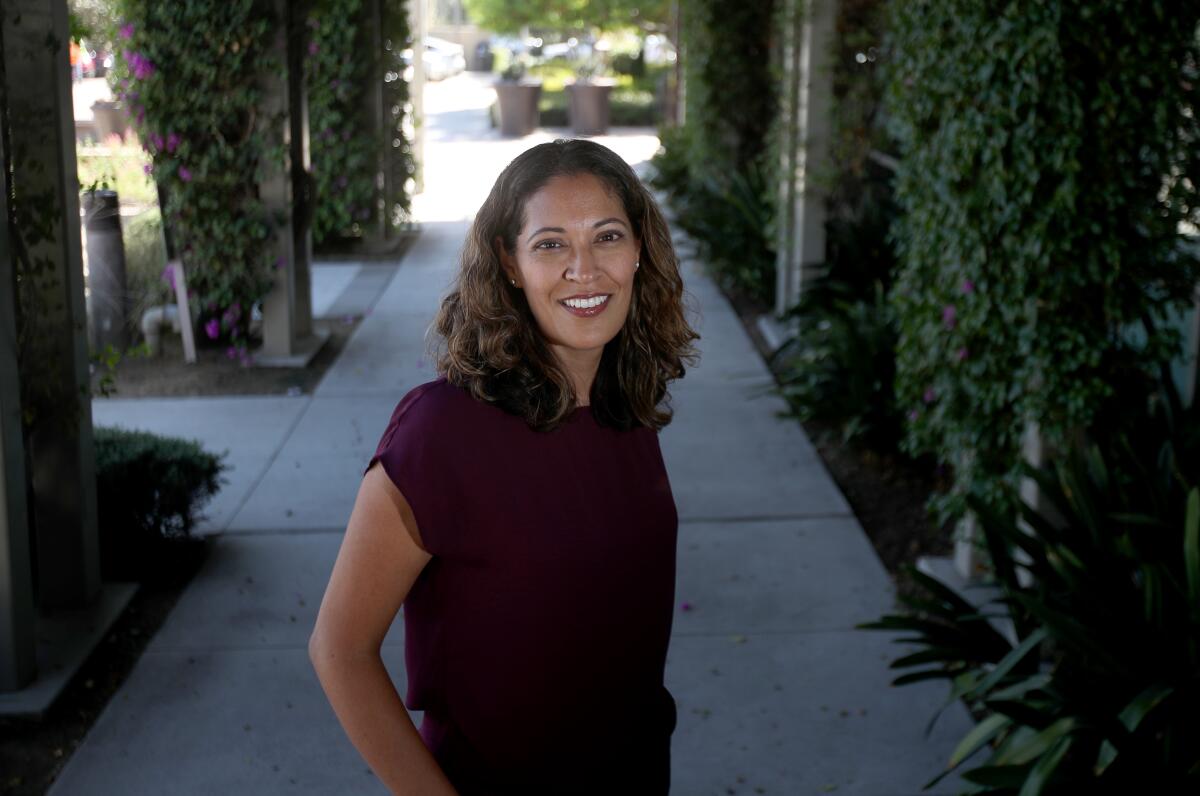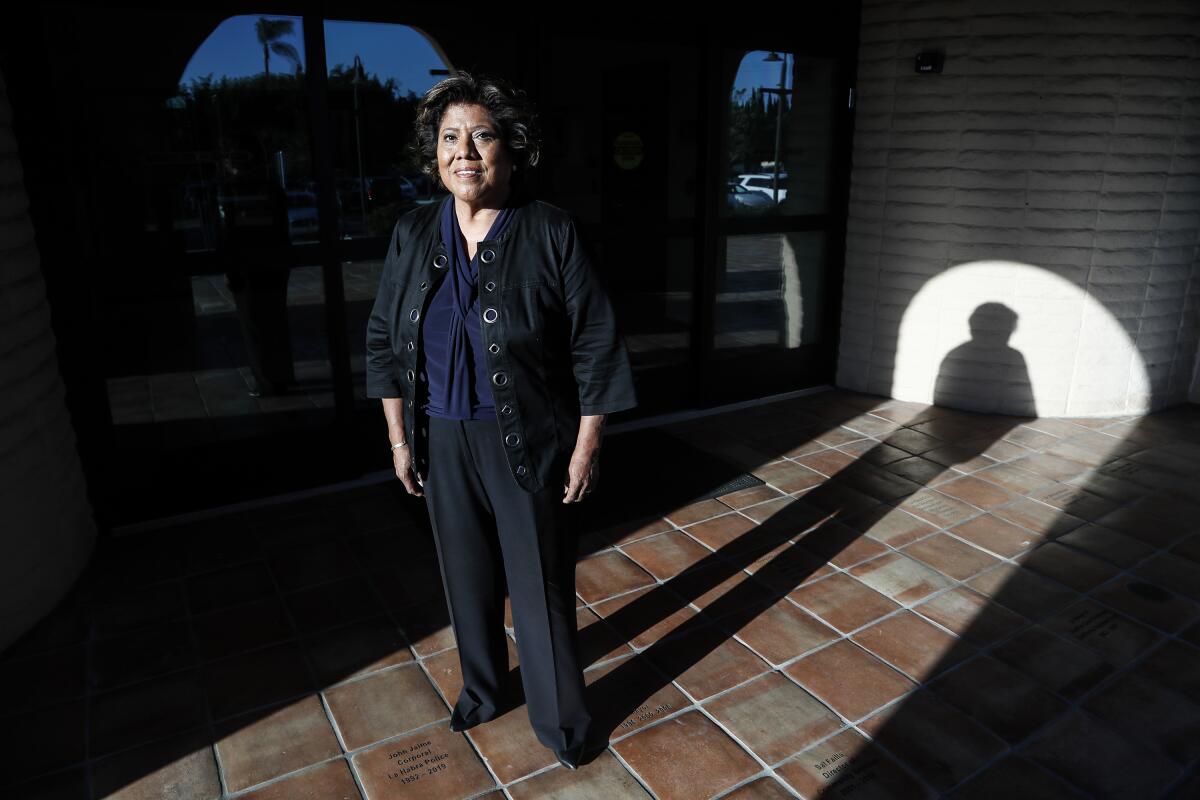Latinas are an emerging force in Orange County politics

- Share via
In Orange County this year, 26 Latinas are running for city council, school board or supervisor offices.
That’s a huge increase from a decade ago, when a handful of Latinas sought local office and only two won.
For the record:
8:55 a.m. Oct. 17, 2022An earlier version of this story said that Valerie Amezcua is president of the Santa Ana Unified school board. She is a member of the board, not the president.
8:28 a.m. Oct. 16, 2022An earlier version of this story said that Andrea Marr is working on her doctoral dissertation at UC San Diego. She is a doctoral student at the University of San Diego.
In the male-dominated field of politics, women have gradually gained a foothold in O.C., as have Latino men. But Latinas have been slower to get involved.
That is changing, partly because of the women’s movement that erupted after Donald Trump was elected president, inspiring a flurry of first-time candidates.
More O.C. cities are also electing their councilmembers by district, rather than at-large, giving candidates a chance to win on support from their own communities.
The Latinas entering politics are Navy veterans, nonprofit executives, small-business women and teachers. Some are immigrants, while others are second-, third- or fourth-generation Americans. Most are Democrats.
They hail from majority-Latino cities like Santa Ana and whiter communities like Mission Viejo.
As O.C. becomes increasingly diverse — the county is 34% Latino and 23% Asian — elected officials should reflect that diversity, to better represent the varied experiences of residents, politicians and community advocates say.
“The loudest voices in the room don’t represent the entire community,” said Andrea Marr, a Costa Mesa city councilwoman who is Latina. “It’s much harder to recognize that most people are working or taking care of their families and don’t have the capacity to also engage in local politics.”
The rise of the Latina politician is one more sign that the old Orange County has given way to a place where whites are a minority and registered Democrats outnumber Republicans.
“I started looking into other councilmembers,” said Cynthia Vasquez, 45, a legal consultant who is running in the race for Mission Viejo City Council. “I figured, ‘Why not me?’ because I’m just as qualified, if not more.”
Vasquez, a Democrat, faces two Republican incumbents, Ed Sachs and Greg Raths, in a district with the largest share of Mission Viejo’s Latino population.
The city, which is about two-thirds white, 19% Latino and 14% Asian, is Republican-dominated but changing politically — a majority of voters backed Joe Biden for president in 2020.
Three councilmembers, including Sachs and Raths, added two years to their terms while the city pursued an alternative to district elections.
If Vasquez wins, she will be the first Latina on the council.
Vasquez hadn’t considered running for office until a lawsuit involving the City Council term extensions caught her attention and she began keeping a closer eye on City Hall.
Then, a local Democratic Party activist asked if she was interested in running herself.
Vasquez hopes that going after the council seat — and perhaps sitting on the dais — will show young people, including her two daughters, what’s possible.
“Growing up, I didn’t have a lot of people that I could look up to that looked like me,” Vasquez said. “I always knew I wanted to be a role model and set an example for other people, especially my girls.”
In 1928, Samuel Bowen was elected mayor of Huntington Beach, becoming the first Latino on an O.C. city council.
In the late 1950s, Mexican American men who were active in the civil rights movement won seats on the Stanton and Placentia city councils.
Orange elected its first Latino councilman, Jess Perez, in 1968. Ray Villa followed in Santa Ana a year later.

More than 30 years passed before Rose Espinoza became O.C.’s first Latina city councilwoman by winning a seat in La Habra in 2000.
Espinoza first sought a council seat in 1992. Her after-school tutoring program had attracted the attention of a Mexican American Legal Defense and Education Fund activist, who urged her to run.
“I didn’t know anything about City Council,” Espinoza said. “All I knew is that I paid my water bill at City Hall — and that’s it.”
But the idea grew on her. Maybe she could bridge the divide between the council and her Mexican American community.
She jumped into a crowded field of candidates — and lost.
Espinoza’s campaign was largely do it yourself. As a professional designer, she fashioned her own lawn signs.
She never got a door hanger, much less an endorsement, from the Democratic Party, and faced a steep learning curve without a seasoned campaign manager.
Two years later, in Anaheim, Loretta Sanchez was defeated by Lou Lopez, who became the city’s first Latino councilmember.
Espinoza and Sanchez commiserated about their losses — and bonded as Latinas attempting to break into local politics.
“I could see that we were both disillusioned,” Espinoza said.
Sanchez picked herself back up and ran for Congress two years later, scoring an upset win over GOP incumbent Bob Dornan. Espinoza persisted, too, finally scoring a council seat on her fourth try.
That same year, Claudia Alvarez, who is now a Superior Court judge, joined the Santa Ana City Council.
About 35% of Orange County city council seats are held by women, a Times review found. Of those women, 11, or 17%, are Latina.
The 26 Latinas running for local office in O.C. this year represent a 73% increase from 2012, when 15 ran.
By 2018, the number was 24.
But despite the increase over the last decade, only about 7% of all candidates this year are Latina.
Orange County has yet to have a Latina county supervisor or a directly elected Latina mayor. (In some cities, the mayor’s seat rotates among councilmembers.)
During her 22 years on the La Habra City Council, Espinoza has run for the Board of Supervisors several times but never won.
She plans to retire in two years, when her council term ends.
“There’s young Latinas out there that are ready,” said Espinoza, 70, who is still executive director of her after-school nonprofit. “When they see someone that has a similar surname or is morena [dark-skinned] like me, they know it’s achievable.”
Now, Espinoza said, more organizations are providing candidate workshops so that aspiring Latinas don’t go into politics as green as she did.
Marr, the Costa Mesa councilwoman, is working on a doctoral dissertation at the University of San Diego about women in local politics.
In her research on why women run, she noticed more women of color are getting elected to local office, particularly Latinas like herself.
And though some scholars have pinned underrepresentation on women being less ambitious, more averse to competitive politics and less likely to see themselves as viable candidates, Marr finds such notions oversimplified.
More nuance is needed, she argued, as women gain confidence in their own qualifications, even without traditional credentials.
“A few of the women I interviewed didn’t have institutional support but found their own way,” Marr said. “They became grass-roots organizers, without calling themselves that.”
In some O.C. cities, council districts were carved out under the threat of litigation, with established politicians loath to lose the advantage they had over upstarts in citywide elections. Anaheim spent $2.5 million fighting a lawsuit before adopting districts and electing its first Latina to the City Council in 2016.
In Costa Mesa, home to South Coast Plaza and a reputation for nativist politics, the first district elections in 2018 resulted in one Latino councilman and two Latina councilwomen — Marr and Arlis Reynolds.
Two years later, in its first district elections, Orange elected its first two Latina councilwomen.
Marr said she would not have run in Costa Mesa without districts.
“It changed the dynamic,” she said. “The bar for fundraising is much lower, and it’s your direct community that is electing you.”
Marisa Calderon, communications officer for Latinas Lead CA, a statewide political action committee formed in 2015 to support Latina candidates, said more Latinas are running for office around the state.
“It has taken active investment in voter outreach and education from a number of organizations to get to this point, and it will take a lot more to achieve parity,” she said.
After the U.S. Supreme Court overturned Roe vs. Wade in June, the Democratic Party of Orange County flooded its members with text messages in an eleventh-hour effort to recruit women of color to run for office.
Heading into November, the party has endorsed more Latinas in O.C., and more candidates overall, than ever before.
“Did I ever think that I would see this many Latinas on the ballot?” said Ada Briceño, a Latina labor leader who has chaired the O.C. Democrats since 2018. “No, but it’s a different world today.”
Among the Latinas running for local office are two aiming to be O.C.’s first directly elected Latina mayor — Valerie Amezcua in Santa Ana and Beckie Gomez in Tustin, who have endorsed each other.
“After 153 years, we need to look at who can really do the job of being mayor of Santa Ana and do it well,” Amezcua said of her city, which is three-quarters Latino. “And that is a Latina.”
Amezcua, a retired probation officer, is a member of the Santa Ana Unified school board. She wants to improve public safety, add more parks and address homelessness through supportive housing.
In a hilly Mission Viejo neighborhood recently, Vasquez rang her first doorbell of the day, armed with a stack of election fliers.
A man wearing a Pink Floyd shirt cautiously pried the door open, providing just enough space for Vasquez to cheerfully introduce herself as a City Council candidate.
She asked if he knew that Mission Viejo had switched to district elections.
“We’re going to be voting this year,” he said. “There’s going to be a big red wave.”
After the brief chat, Vasquez gave the man a flier. She had better luck at the next house, where a retiree took a lawn sign for his wife, a registered Democrat.
Vasquez is promising to be a good steward of taxpayer money and a champion of small businesses while keeping Mission Viejo a safe, quiet suburb to raise a family.
“I always kept my ambitions to myself because I didn’t want anyone to tell me that I couldn’t do something,” she said. “But at the same time, I am very much a woman that says, ‘Oh, you say I can’t? Watch me.’”
More to Read
Sign up for Essential California
The most important California stories and recommendations in your inbox every morning.
You may occasionally receive promotional content from the Los Angeles Times.











